20 Mar 2018 | Awards, Fellowship 2018, News
[vc_row][vc_column][vc_video link=”https://youtu.be/YgtBa8yoc80″][vc_column_text]Zimbabwean performance artist and activist Silvanos Mudzvova uses theatre to protest against the repressive regime of former president Robert Mugabe and to agitate for greater democracy and LGBT rights. 
“Artists in Zimbabwe have a lot of fear and only artists who support the regime can openly critique freely,” Mudzvova says. “However, I have started a revolution, where so many artists are producing resistance art works. I have managed to employ fellow artists to openly condemn the Mugabe regime leading to the term ‘arts activism’ becoming popular in Zimbabwe.”
Many of Mudzvova’s recent works in Zimbabwe have involved “guerrilla” theatre. He has specialised in performing “hit-and-run” actions in public places to grab the attention of politicians and defy censorship laws which forbid public performances without police clearance.
Mudzvova has been abducted, beaten and arrested for his work. In April 2016, he put on a one-man play outside the country’s parliament. The play, Missing Diamonds, I Need My Share, was inspired by the controversy surrounding Mugabe’s admission that the country lost $15 billion to diamond companies without any legal consequences. Mudzvova was arrested as a result. In September 2016, Mudzvova was abducted from his home, beaten and left for dead for participating in the Tajamuka (We Are Rising Up) protest group.
Mudzova has been vocal about the recent political change in Zimbabwe, stating that the new government should “engage the international community and rebuild relations and above all end corruption and improve the human rights situation. He should work with opposition to create an environment conducive for free and fair elections.”
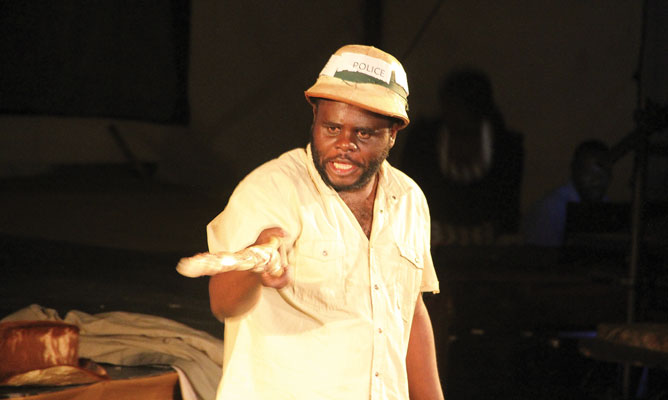
His play In Chains has been replicated in several anti-government demonstrations in Zimbabwe and across the world by Zimbabweans as a creative protest against the regime. And Mudzova himself has continued to use his position as a prominent theatre activist to post videos on his Facebook site BhanditTV.
“The nomination motives me to work extra hard for the removal of censorship laws and it has given exposure to my profile as a human rights defender,” he told Index on Censorship. “This also improves my personal security from the junta government as they now know the world is watching.”
See the full shortlist for Index on Censorship’s Freedom of Expression Awards 2018 here.[/vc_column_text][/vc_column][/vc_row][vc_row full_width=”stretch_row_content” equal_height=”yes” el_class=”text_white” css=”.vc_custom_1490258749071{background-color: #cb3000 !important;}”][vc_column width=”1/2″][vc_custom_heading text=”Support the Index Fellowship.” font_container=”tag:p|font_size:28|text_align:center” use_theme_fonts=”yes” link=”url:https%3A%2F%2Fwww.indexoncensorship.org%2Fsupport-the-freedom-of-expression-awards%2F|||”][vc_column_text]
By donating to the Freedom of Expression Awards you help us support
individuals and groups at the forefront of tackling censorship.
Find out more
[/vc_column_text][/vc_column][vc_column width=”1/2″ css=”.vc_custom_1521479845471{background-image: url(https://www.indexoncensorship.org/wp-content/uploads/2017/05/2017-awards-fellows-1460×490-2_revised.jpg?id=90090) !important;background-position: center !important;background-repeat: no-repeat !important;background-size: cover !important;}”][/vc_column][/vc_row][vc_row][vc_column][vc_basic_grid post_type=”post” max_items=”4″ element_width=”6″ grid_id=”vc_gid:1521542120650-a4167fa1-ebad-5″ taxonomies=”10735″][/vc_column][/vc_row]
30 Jan 2018 | News, Volume 46.04 Winter 2017, Volume 46.04 Winter 2017 Extras
[vc_row][vc_column][vc_column_text]
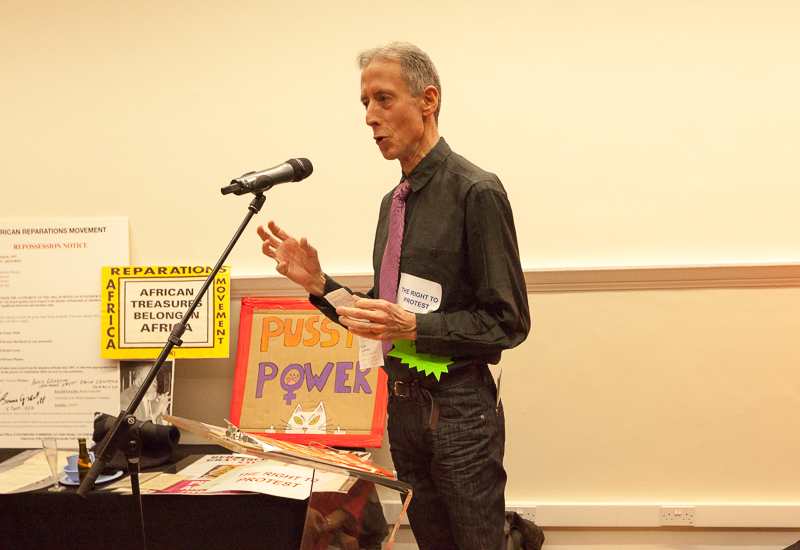
Peter Tatchell discusses the importance of the right to protest. (Photo: Sean Gallagher / Index on Censorship)
Index on Censorship magazine celebrated the launch of its winter 2017 magazine at the Bishopsgate Institute in London with an evening exploring the legacies of iconic protests from 1918 and 1968 to the modern day and reflecting on how today, more than ever, our right to protest is under threat.
Speakers for the evening included human rights campaigner Peter Tatchell, Bishopsgate Institute special collections and archives manager Stefan Dickers and artist Patrick Bullock.
Tatchell discussed the importance of protest for any democracy and the significant anniversaries of protests in 2018 throughout his speech. “This year is a very special year, a very historic year, I think that those protests remind us that protest is vital to democracy,” he said. “It is a litmus test of democracy, it is a litmus of a healthy democracy. Democracies that don’t have protest, there is a problem, in fact, you might even say they aren’t true democracies.”
“With 1968 came the birth of the women’s liberation movement, the mass protests in Czechoslovakia against Russian occupation, and, of course, the huge protests against the American war in Vietnam,” Tatchell added. “Those protests all remind us that protest is vital to democracy.”
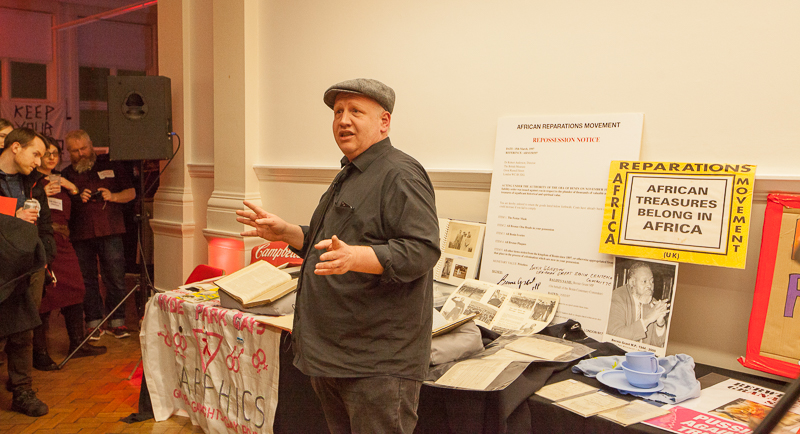
Bishopsgate Institute special collections and archives manager Stefan Dickers at the launch of What price protest? (Photo: Sean Gallagher / Index on Censorship)
This year also marks the centenary of the right to vote for women in Britain. Dickers showcased artefacts the Bishopsgate Institute’s collection of protest memorabilia, including sashes worn by the Suffragettes and tea sets women were given upon leaving prison for activities related to their activism.
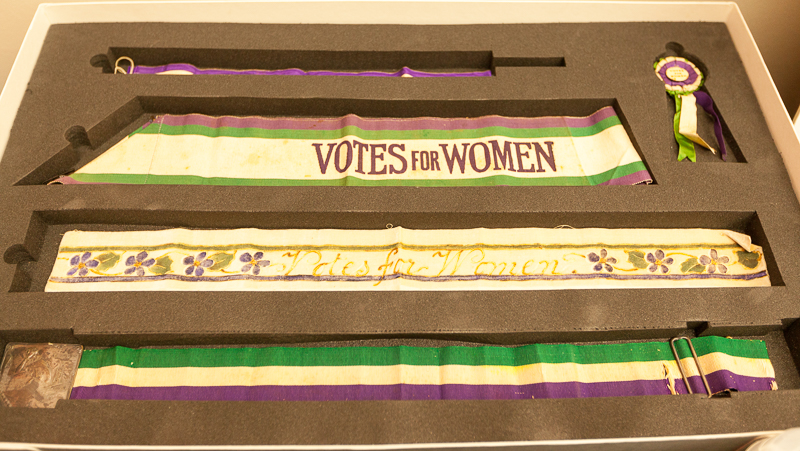
Suffragette sashes at the launch of What price protest? (Photo: Sean Gallagher / Index on Censorship)
Attendees included actor Simon Callow, who stressed the importance of protest and freedom of expression: in an interview at the event with Index on Censorship. “There are all sorts of things that people find inconvenient and uncomfortable to themselves, that they don’t wish to hear, but that’s not the point,” he said. “The point is that if some people feel very strongly that certain things are wrong, then they must be allowed to say something.”
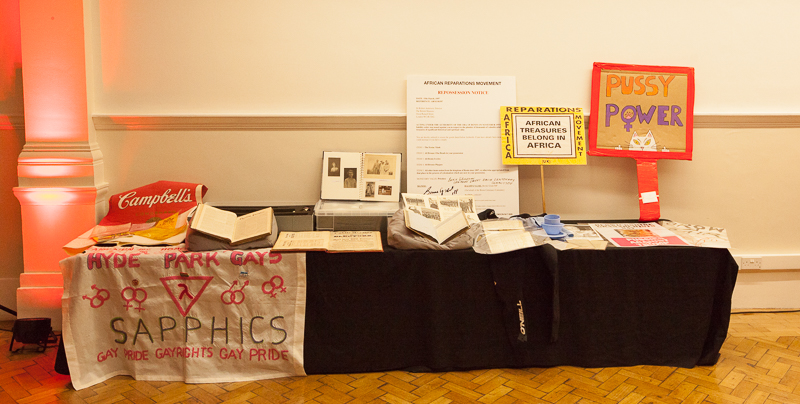
Disobedient objects at the launch of What price protest? (Photo: Sean Gallagher / Index on Censorship)
Eastenders actress Ann Mitchell, who also attended the event, said: “There is no question in my opinion, that the darkness in the world at the moment must be protested against. All the advantages we have won as women, as ethnic minorities, are being destroyed, they are being wiped out. Unless we hear voices of protests for that, that will continue.”
The night concluded with a performance by protest choir Raised Voices.
Index magazine’s winter issue on the right to protest features articles from Argentina, England, Turkey, the USA and Belarus. Activist Micah White proposes a novel way for protest to remain relevant. Author and journalist Robert McCrum revisits the Prague Spring to ask whether it is still remembered. Award-winning author Ariel Dorfman’s new short story — Shakespeare, Cervantes and spies — has it all. Anuradha Roy writes that tired of being harassed and treated as second-class citizens, Indian women are taking to the streets.b
[/vc_column_text][/vc_column][/vc_row][vc_row][vc_column width=”1/3″][vc_custom_heading text=”What price protest?”][vc_column_text]Through features, interviews and illustrations, the winter issue of Index on Censorship magazine looks at the state of protest today, 50 years after 1968, and exposes how it is currently under threat.
With: Ariel Dorfman, Anuradha Roy, Micah White, Richard Ratcliffe[/vc_column_text][/vc_column][vc_column width=”1/3″][vc_single_image image=”96747″ img_size=”medium”][/vc_column][vc_column width=”1/3″][vc_custom_heading text=”Subscribe”][vc_column_text]In print, online. In your mailbox, on your iPad.
Subscription options from £18 or just £1.49 in the App Store for a digital issue.
Every subscriber helps support Index on Censorship’s projects around the world.
 SUBSCRIBE NOW[/vc_column_text][/vc_column][/vc_row]
SUBSCRIBE NOW[/vc_column_text][/vc_column][/vc_row]
25 Jan 2018 | News, Volume 46.04 Winter 2017
[vc_row full_width=”stretch_row_content_no_spaces” full_height=”yes” css_animation=”fadeIn” css=”.vc_custom_1516891729158{background: #ffffff url(https://www.indexoncensorship.org/wp-content/uploads/2018/01/6MD4OKVXIG5JX3NEIA2M_prvw_63818-1024x683ss-1.jpg?id=97759) !important;}”][vc_column width=”1/6″][/vc_column][vc_column width=”2/3″][vc_custom_heading text=”After Gothenburg and Frankfurt book fairs faced tension over who was allowed to attend, we asked four leading thinkers, Peter Englund, Ola Larsmo, Jean-Paul Marthoz, Tobias Voss, to debate the issue” font_container=”tag:h2|text_align:left|color:%23000000″][/vc_column][vc_column width=”1/6″][/vc_column][/vc_row][vc_row][vc_column][vc_column_text]
WORDS APART
In the first of a series of pieces on where the line is drawn on freedom of speech at book fairs, DOMINIC HINDE interviews PETER ENGLUND, a former member of the Swedish Academy’s Nobel committee
Peter Englund is a familiar face around the world, even if many outside Sweden would struggle to place him straight away. For seven years, the award-winning author and former permanent secretary to the Swedish Academy was a fixture on TV screens, emerging each autumn to announce the winner of the Nobel Prize in Literature.The Nobel committee has attracted criticism for some of its choices over the years, but Englund, who retired from the post in 2015, said its decisions were never politically charged, and that the Swedish tradition of open dialogue had always been a core principle.
“When I was permanent secretary I used to say that you could never win the Nobel Prize because of your political view, but that it was quite possible to win in spite of your political attitude. The Swedish Academy is also extremely conscious of the extraordinary importance of freedom of expression, not least because it is a basic requirement if writers and researchers are going to be able to work properly.”
Englund is a long-time supporter of free speech causes around the world and, in his own work, has written extensively about totalitarianism in Europe under both communist and fascist regimes. He recently joined the debate closer to home on the competing demands of freedom of speech and growing right-wing movements in Sweden.
The past decade has seen the emergence of far-right populism in the traditionally liberal and open Nordic state. The Sweden Democrats party – who grew from the fringe white power movement in the 1990s – have made significant inroads in parliament and an alternative far-right media has blossomed. More extreme neo-Nazi groups have ridden on the coat tails of the Sweden Democrats and asserted their right to protest in the name of free speech, claiming Sweden is a country in decline, where the mainstream media ignores crime and immigration issues. Englund and some of his fellow writers have increasingly found themselves dubbed an elite of “cultural Marxists” by far- right activists. There is even a Swedish word – åsiktskorridor – which specifically refers to the narrow corridor of opinion extremists assert is allowed by the political establishment.
“I think it is important that we quite simply refuse to recognise this description of the situation. It is an important part of the populist right’s tactics to whip up ‘culture wars’ over more-or-less fictional symbolic questions, and you have to avoid letting yourself get dragged in,” said Englund.
Confronted with the openly anti-democratic and xenophobic politics which is emerging, many on the Swedish left and centre-right have begun to grapple with how Sweden, which has the oldest press freedom laws in the world, can reconcile its commitment to free speech and diversity with such views. In September 2017, the debate came to a head when Nya Tider (New Times), a populist right-wing newspaper, which has been accused of publishing fake news, was booked to appear at the annual Gothenburg Book Fair.
The fair is Sweden’s biggest cultural and journalistic event, but several well-known journalists and writers who would usually be there chose to stay away in protest at Nya Tider’s attendance. Some argued that Sweden’s tradition of a free press meant even the far-right were entitled to have their opinions heard, but Englund and others decided not to take part.
“I chose not to participate because it meant that I would have to appear on the same stage – broadly speaking – as these right-wing extremists, homophobes, conspiracy theorists, anti-Semites, Holocaust deniers and Putin supporters, and that would have helped to normalise their views,” argued Englund.
He believes that freedom of expression does not mean automatically welcoming extremists to all platforms, and that the Swedish commitment to an open society does not entail encouraging participation by extremist voices.
“Another important tactic for the populist right is to make themselves mainstream, and that is not something I want to contribute to” he explained. “For me [The Gothenburg controversy] was not a question of freedom of expression. That freedom remains intact. Nobody has tried to stop their paper being printed or attacked their journalists. On top of that, freedom of expression does not mean that you can be allowed to say anything at all, and does not mean that you have an absolute right to take part in any kind of forum.”
Events in Gothenburg reflected a wider disagreement in Swedish society about how best to counter populist politics and where the line between freedom of expression and extremism sits. Englund acknowledges that opponents of the far-right have not always got this right. The country goes to the polls in less than a year and the Sweden Democrats have ambitions to play a role in government, meaning the question may soon become more pressing than ever.
“In Sweden there have been attempts to deal with the far-right question through a combination of shutting them out and through triangulation,” he said. “Shutting them out means refusing to co-operate with them. Triangulation is not about accepting their description of the situation, or their proposed methods for dealing with it, but about understanding that among their voters there is a frustration, and even a fear, which does somehow need to be addressed, and which you can neither ignore nor tweet to death with smart sarcastic posts.
“History is fairly instructive on this. A necessary step for those sorts of movements to come to power – and this happened in both Italy and Germany – was that already established power structures had to invite them in, operating under the serious misconception that they could then be tamed. Those countries that were able to avoid fascism in the 1930s did it not least by showing resistance instead.”
That means being prepared to challenge those from all sides who threaten democratic principles, he believes.“We should, of course, be wary of the threat from the extreme right – the past tells us that – in the same way we have to keep an eye out for what is happening on the extreme left. I believe in democracy in Europe, but to avoid it meeting the same fate as the Weimar Republic, it has to be belligerent.”
Dominic Hinde is a journalist
[/vc_column_text][/vc_column][/vc_row][vc_row][vc_column width=”1/4″][vc_icon icon_fontawesome=”fa fa-quote-left” color=”custom” align=”right” custom_color=”#dd3333″][/vc_column][vc_column width=”3/4″][vc_custom_heading text=”The Swedish Academy is also extremely conscious of the extraordinary importance of freedom of expression” google_fonts=”font_family:Libre%20Baskerville%3Aregular%2Citalic%2C700|font_style:400%20italic%3A400%3Aitalic”][/vc_column][/vc_row][vc_row][vc_column][vc_column_text]
WHY I ATTENDED GOTHENBURG
Award-winning Swedish author OLA LARSMO explains why he went to the Gothenburg Book Fair
One of the important freedom of expression debates in Sweden has been running for about a year now and concerns the annual Gothenburg Book Fair. When it was announced that the extreme right-wing publication Nya Tider was allowed to rent a space at the 2017 Fair, some 200 Swedish writers wrote in a joint statement that they would not attend. This sparked a heated debate. What about defending the rights of people to spread deplorable or even dangerous opinions? What happens if you don’t?
I decided to attend the fair – along with other writers who stated that they would not be run out of the place by extremists. But I have great respect for those who chose not to. We are all trying to defend society against what must be considered a rising tide of fascism. But how to do that, and at the same time defend freedom of speech?
On 7 April 2017, a man hijacked a truck in central Stockholm and drove down a pedestrian street, targeting everyone in his way. Five people were killed. The suspect later said he was acting as a supporter of Isis. The response from ordinary people was massive. Beside the mountain of flowers in central Stockholm, it was obvious that everybody was determined to counteract the intimidation of terror by going on with life as normally as they could, because the trust between ordinary citizens is what makes an open society possible.
This was very much at the back of my mind when I decided to go to the fair. We also managed to organise a number of seminars and events that addressed the threat hate speech poses to freedom of speech. It felt like an opportunity to point to the elephant in the middle of the room.
Nya Tider is not “banned” – in fact they receive a tax- financed grant of about $358,167 – the same as other papers with the same circulation. The question was whether the fair had an obligation to open its space to a paper associated with the extreme right. Since the fair is a private enterprise, many felt that they were within their rights to choose their exhibitors freely.
During the last few years, Swedish writers, journalists and politicians have been facing a rising wave of death threats and hate speech. Solid research shows that these threats emanate mostly from right-wing extremists and, to a lesser degree, from radical Islamists.
They target publicists with the purpose of driving them to self-censorship.
So how, then, should society deal with these threats with- out lowering the ceiling for freedom of speech? That this threat is real became obvious as a demonstration of several hundred neo-Nazis tried to reach the fair on the Saturday, but were stopped by the Gothenburg police. The attendance that day shrank to half the ordinary numbers.Writers are a specific target for these extremists, and the 200 writers stated openly that they did not want to share the floor with a paper associated with that political agenda.Personally I feel that those of us committed to defending freedom of speech have to use all powers to counter the double threat we are now facing: that of intimidation through hate speech and, on the other hand, stronger legislation that threatens to smother what it is supposed to defend. We can’t close our eyes to either.
Ola Larsmo is a long-time president of Swedish PEN
[/vc_column_text][vc_row_inner][vc_column_inner width=”1/4″][/vc_column_inner][vc_column_inner width=”3/4″][/vc_column_inner][/vc_row_inner][vc_column_text]
MAKING IT FAIR
No serious book fair could exclude or censor a legal publication, argues Frankfurt’s vice president of international affairs TOBIAS VOSS
The Frankfurt Book Fair is a commercial enterprise. Yet the “commodity” we trade in is a very distinctive one: books convey ideas and, among other things, ideas significantly shapes social discourse, whether aesthetic, moral or political in nature. In this respect, it is necessary to regularly question the limiting of “critical” or “problematic” content. All book fairs thrive on the diversity of content presented by participants. In this regard, book fairs that strive to meet this objective are, therefore, a demonstration of the diversity of opinion and discourse. No serious international book fair that aims to represent the market and diversity of opinion is in a position to exclude or censor market players.
This approach – tolerating at times extremely problematic positions – must then also apply to titles that are perceived as an affront, as offensive or downright repugnant, by segments of the public.
The only exception for such a ban or exclusion is existing legislation. Only if a title is forbidden by law in Germany, then we feel it is right to ban this title or even the actual fair participant, from the exhibition.
Our book fair respects the separation of powers as an essential organisational principle for guaranteeing democratic freedoms, the associated institutions and the decisions and measures established under it. Whenever existing laws are violated at Frankfurt, we, as the organiser, will take action against this infringement through the department of public prosecution and the police.
A functioning democracy must tolerate dissent (as it has, after all, done successfully in Germany for decades), and must accept that the freedom of expression also applies to segments of the public that question – and at times even wish to do away with – the established legal order. The fair does not see it as its duty to establish its own political, moral or aesthetic criteria for permitting or forbidding things.
In keeping with its principles, the Frankfurt is committed to freedom of expression, freedom of publication, dialogue as a means of fair communication and respect for the democratic separation of powers and the decisions and measures that have been established to ensure it. The fair demonstrates this position in a wide variety of ways – through international involvement, by supporting the “Cities of Refuge” project and by curating well over 200 discussion events at our event and at book fairs abroad.
Tobias Voss is vice president, international affairs, of the Frankfurt Book Fair
[/vc_column_text][vc_row_inner][vc_column_inner][vc_column_text]

Crowds gather outside the Frankfurt Book Fair, the world’s largest book trade-fair, Marc Jacquemin/Frankfurt Book Fair
[/vc_column_text][/vc_column_inner][/vc_row_inner][vc_row_inner][vc_column_inner width=”1/4″][/vc_column_inner][vc_column_inner width=”3/4″][/vc_column_inner][/vc_row_inner][vc_column_text]
TALK THE TALK
Banning organisations with which you disagree means you don’t have the chance to argue your case, says JEAN-PAUL MARTHOZ
The recent Gothenburg and Frankfurt book fairs have again been riven with controversies around the presence of far-right publishers. From a progressive perspective, banning the far-right seems the appropriate thing to do. The rationale is clear: the barbarians are at the gates and no one has ever said that democracies should offer their foes the rope with which to hang them.
From a liberal point of view, however, things are not so easy. Liberal democracies are, by definition, committed to providing space to ideas that radically question their most essential values – and even threaten their very existence.
There should be freedom for the enemies of freedom. As long as far-right publishers are not legally banned, and don’t exhibit books that clearly flout the law, there are few arguments against them which would pass Voltaire’s test on freedom of expression.
While the far-right has been associated with the most thuggish forms of censorship, its leaders have been effective in denouncing the progressives’ “fear of the truth”. Free speech for me, but not for thee?
By principle, liberals should not concede one of their most iconic values to the far- right, even if the latter has opportunistically hijacked free speech in order to provide a veneer of respectability to hate speech.
Banning can be seen as a confession of weakness or an admission that liberal arguments are not convincing enough to be – nor capable of being – expressed in a way which might distract potential far-right sympathisers from extremist organisations.
In fact, any attempt to get the far-right out of the public arena only reinforces one of its core recruiting arguments: “patriots” are victims of a conspiracy in a “rigged system” run by a cosmopolitan and hypocritical liberal establishment.
Responding to the far-right is all the more crucial today, since it has the capacity to get around its exclusion and reach a wide audience through the internet and social networks. The only way to reduce its influence is to produce counter-arguments and alter- native discourse and disseminate them widely beyond the converted.
Banning an organisation, or censoring its ideas, too often exempts it from the rigorous and imaginative thinking which is the only effective way to push back and win the battle of ideas.
Jean-Paul Marthoz is a Belgian journalist and essayist. He is the author of The Media and Terrorism (2017, Unesco)
[/vc_column_text][/vc_column][/vc_row][vc_row][vc_column][vc_custom_heading text=”From the Archives”][vc_row_inner][vc_column_inner width=”1/3″][vc_single_image image=”93959″ img_size=”full” alignment=”center” onclick=”custom_link” link=”http://journals.sagepub.com/doi/pdf/10.1080/03064228408533808″][vc_custom_heading text=”Book fair detention” font_container=”tag:p|font_size:24|text_align:left” link=”url:http%3A%2F%2Fjournals.sagepub.com%2Fdoi%2Fpdf%2F10.1080%2F03064228408533808|||”][vc_column_text]December 1984
An excerpt from Mindblast, a book by Dambudzo Marechera, which was due to be launched at the Second Zimbabwe Book Fair.
[/vc_column_text][/vc_column_inner][vc_column_inner width=”1/3″][vc_single_image image=”94784″ img_size=”213×289″ alignment=”center” onclick=”custom_link” link=”http://journals.sagepub.com/doi/pdf/10.1080/03064227508532452″][vc_custom_heading text=”Sweden: Limits of press freedom” font_container=”tag:p|font_size:24|text_align:left” link=”url:http%3A%2F%2Fjournals.sagepub.com%2Fdoi%2Fpdf%2F10.1080%2F03064227508532452|||”][vc_column_text]September 1975
Blaine Stothard reports on the Swedish Watergate and potential limits on press freedom.
[/vc_column_text][/vc_column_inner][vc_column_inner width=”1/3″][vc_single_image image=”90797″ img_size=”213×289″ alignment=”center” onclick=”custom_link” link=”http://journals.sagepub.com/doi/pdf/10.1080/03064229808536482″][vc_custom_heading text=”White noise: separatist rock” font_container=”tag:p|font_size:24|text_align:left” link=”url:http%3A%2F%2Fjournals.sagepub.com%2Fdoi%2Fpdf%2F10.1080%2F03064229808536482|||”][vc_column_text]November 1998
Neo-Nazi groups are recruiting throughout the developed world; leading the drive are their high energy, punk-derived anthems of hate. [/vc_column_text][/vc_column_inner][/vc_row_inner][vc_separator][/vc_column][/vc_row][vc_row content_placement=”top”][vc_column width=”1/3″][vc_custom_heading text=”What price protest?” font_container=”tag:p|font_size:24|text_align:left” link=”url:https%3A%2F%2Fwww.indexoncensorship.org%2F2017%2F12%2Fwhat-price-protest%2F|||”][vc_column_text]In homage to the 50th anniversary of 1968, the year the world took to the streets, the winter 2017 issue of Index on Censorship magazine looks at all aspects related to protest.
With: Micah White, Ariel Dorfman, Robert McCrum[/vc_column_text][/vc_column][vc_column width=”1/3″][vc_single_image image=”96747″ img_size=”medium” alignment=”center” onclick=”custom_link” link=”https://www.indexoncensorship.org/2017/12/what-price-protest/”][/vc_column][vc_column width=”1/3″ css=”.vc_custom_1481888488328{padding-bottom: 50px !important;}”][vc_custom_heading text=”Subscribe” font_container=”tag:p|font_size:24|text_align:left” link=”url:https%3A%2F%2Fwww.indexoncensorship.org%2Fsubscribe%2F|||”][vc_column_text]In print, online. In your mailbox, on your iPad.
Subscription options from £18 or just £1.49 in the App Store for a digital issue.
Every subscriber helps support Index on Censorship’s projects around the world.
 SUBSCRIBE NOW[/vc_column_text][/vc_column][/vc_row]
SUBSCRIBE NOW[/vc_column_text][/vc_column][/vc_row]
2 Jan 2018 | Journalism Toolbox Spanish
[vc_row][vc_column][vc_custom_heading text=”Puede que en Estados Unidos estén aún acostumbrándose a sus «fake news», pero los bielorrusos llevan años lidiando con la táctica de las noticias fabricadas, relata Andrei Aliaksandrau.”][vc_row_inner][vc_column_inner][vc_column_text]
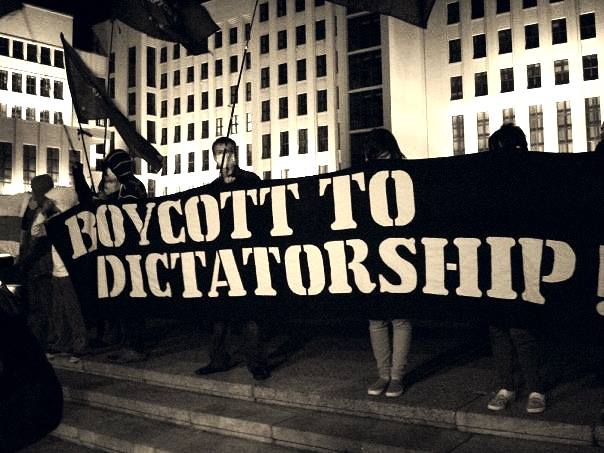
Las fuerzas especiales rodean a manifestantes en Minsk (Bielorrusia) tras las elecciones fraudulentas de 2010, Isabel Sommerfeld/Flickr
[/vc_column_text][/vc_column_inner][/vc_row_inner][/vc_column][/vc_row][vc_row][vc_column][vc_column_text]
En Bielorrusia, inventar noticias no es una novedad. Una historia que consistía en imágenes espantosas de manifestantes armados con cócteles molotov y otros objetos recorrió en abril los canales de televisión y periódicos del estado. Los manifestantes, afirmaban los reporteros, pertenecían a la Legión Blanca, cuyos miembros presuntamente buscaban encender en Minsk una revuelta similar a la de las protestas del Euromaidán, que se extendieron por toda Ucrania en 2013 y 2014 y contribuyeron a la crisis de Crimea.
Curiosamente, los productores y reporteros de estos vídeos y artículos eran anónimos. No había ni títulos ni firmas, ni tampoco pruebas de que la Legión Blanca, que existió en su día, hubiera llevado a cabo operación alguna en los últimos años. También es curioso que ni la policía ni las fuerzas de seguridad quisieran responder a las preguntas de periodistas y ciudadanos sobre el caso.
Resulta que la historia era una invención con envoltorio de noticia, un fragmento retorcido de la realidad, emitido para sembrar el miedo y el pánico en la sociedad. El mensaje era: No salgáis a las calles a protestar. Quienes lo hacen socavan la paz y la estabilidad.
Se trata de una táctica habitual que lleva años dándose en Bielorrusia, donde las noticias reales se reprimen y proliferan las falsas. Es una estrategia de uso muy extendido en este momento, siendo 2017 testigo de las protestas más intensas que ha visto el país en años, y a las que el gobierno ha respondido con brutalidad.
Bastante próspera bajo el régimen soviético, Bielorrusia sufrió un declive financiero tras la caída de la URSS. En medio del desconcierto económico y político, Alexander Lukashenko llegó al poder. El presidente sigue aferrado a él 23 años después, debido en gran medida a un estricto control de los medios de comunicación. Los ataques a la prensa, a blogueros, a escritores y a periodistas independientes se perpetúan al mismo tiempo que continúan las actividades de la extensa máquina propagandística del estado.
Los informativos de los canales nacionales de televisión —y no hay ningún canal nacional que no sea propiedad del estado— siguen un patrón simple a la par que persuasivo: aquí va una noticia sobre el presidente; aquí está saludando a un embajador extranjero y dando un discurso sobre el papel especial que desempeña Bielorrusia en la estabilidad y la paz mundial; aquí está reunido con el ministro del interior y haciendo una declaración sobre la importancia de preservar la estabilidad y la paz en la sociedad; aquí está gritando al consejo de ministros que tienen que hacer lo que haga falta para seguir sus sabias ideas por el bien del pueblo (por no hablar de la paz y la estabilidad); aquí está visitando la fábrica de una pequeña ciudad hablándoles a los obreros cual padre bondadoso, diciéndoles que él proveerá.
Tras media hora con cosas así, le llega el turno a un caleidoscopio de imágenes del resto del mundo: proyectiles cayendo sobre Ucrania; bombas destruyendo un hospital sirio; algún presidente raro haciendo declaraciones absurdas al otro lado del océano; un terrorista haciendo estallar otra ciudad europea; refugiados, inundaciones, recesiones, gobiernos que colapsan.
Y, después, una historia de niños felices en una guardería bielorrusa. Más imágenes de un país pacífico guiado por un sabio líder que se erige como el último bastión de felicidad, la última isla de estabilidad en un mundo violento.
[/vc_column_text][/vc_column][/vc_row][vc_row][vc_column width=”1/4″][/vc_column][vc_column width=”3/4″][/vc_column][/vc_row][vc_row][vc_column][vc_column_text]
Pero hay otros tipos de programas en la televisión nacional. Los emiten cuando las autoridades empiezan a notar que la imagen de «paz y estabilidad» que proyectan contradice a la otra realidad: la que la gente ve en las calles y en el trabajo, en las tiendas y en el transporte público, en hospitales y escuelas; la realidad de la vida fuera de la matriz de la propaganda del estado.
A comienzos de 2017, miles de personas de todo el país salieron a la calle a manifestarse. Las protestas fueron provocadas por un nuevo decreto presidencial, el tercero, que multa a quienes no puedan demostrar tener un trabajo o fuente de ingresos oficial. Lo han apodado el decreto «del parásito social». Existe un antiguo término soviético, tuniejadcy, cuyo significado oficial es «parásito»: el «parasitismo» estaba considerado delito en la era soviética, pues se esperaba que todo el mundo trabajase para construir «la sociedad utópica comunista». He aquí una innovación bielorrusa: en lugar de subvencionar a los parados, el gobierno ha decidido multarles.
El decreto solo fue el detonante. La verdadera razón de las protestas es la profunda crisis económica que asola el país. Resulta que la «estabilidad» bielorrusa se trata en realidad de un estado de coma. Nuestra economía, fundamentada en la industria, es herencia de la era soviética y nunca ha pasado por reformas. Estas habrían conllevado la privatización, la modificación de leyes para asegurar garantías al capital, la independencia del poder judicial y un parlamento electo en condiciones, en lugar de uno puesto a dedo por el presidente. Estos pasos, de haberlos seguido, habrían socavado profundamente el régimen autoritario.
Así pues, la economía del país ha llegado hasta hoy sin mayores alteraciones. Durante casi dos décadas se benefició del petróleo y el gas que llegaban baratos de Rusia, así como de préstamos que el Kremlin se podía permitir debido a los altos precios del petróleo y a la necesidad de contar con un aliado cerca. La relación se ha enfriado desde entonces, en parte por la oposición de Bielorrusia a la anexión rusa de Crimea.
La gente comenzaba a notar las dificultades económicas, especialmente en las ciudades pequeñas. Entonces fue cuando llegó el impuesto del «parásito social», que desató las protestas. La gente salió a las calles de Bielorrusia por primera vez desde 2011; en algunos pueblos, no lo hacían desde la década de 1990.
Las movilizaciones recibieron una dura respuesta. La policía arrestó a cientos de personas, a pesar de la naturaleza totalmente pacífica de las manifestaciones. Durante los acontecimientos de Minsk de marzo de 2017, las fuerzas antidisturbios actuaron con brutalidad y arrestaron a alrededor de mil personas. Algunas de ellas eran transeúntes detenidos por error. Otros, periodistas con acreditación en regla.
Aliaksandr Barazenka, cámara del canal Belsat TV, fue detenido durante las protestas del 25 de marzo de 2017 en Minsk. Existe un vídeo de él gritando «¡Soy periodista!» a matones uniformados, que lo agarran y lo meten a rastras en un furgón policial. Más tarde, en el juzgado, los agentes antidisturbios dijeron que Barazenka había estado jurando en público. El juez no prestó la más mínima atención a las claras discrepancias entre sus declaraciones. Barazenka fue condenado a 15 días de detención administrativa, que pasó en huelga de hambre en un centro de detención. Se dieron muchos más ejemplos como estos durante la primavera de 2017. Pero estas historias nunca salen por la televisión estatal.
Pese a todo, aún quedan medios independientes, de un modo u otro, en Bielorrusia. Todavía hay algún periódico no perteneciente al estado, alguna publicación digital que muestra lo que está pasando. Hay blogueros y redes sociales. De hecho, cuando los medios nacionales transmitieron el montaje de los cócteles molotov, emergió un vídeo en internet que revelaba que no había ni policía ni supuestos delincuentes, solo una furgoneta y un puñado de operadores de cámara de la televisión del estado.
Por mucho que se estén contando las historias del periodista Barazenka y de otros manifestantes detenidos, desgraciadamente la realidad delirante y violenta de la televisión nacional prevalece. «Las palabras de los medios están devaluadas. A las autoridades ya no les interesa lo que sabemos ni lo que pensamos sobre ellas», afirmó Viktar Martinovich, escritor bielorruso de éxito, en el Belarus Journal. «Ya no les hace falta público. Están solos. Creen que son lo bastante poderosos, que son eternos. Y nos faltan las palabras para demostrar que se equivocan».
Aquí hay uno que cree que encontraremos las palabras.
[/vc_column_text][/vc_column][/vc_row][vc_row][vc_column][vc_column_text]
Andrei Aliaksandrau es un periodista afincado en Minsk, Bielorrusia. Es editor del Belarus Journal.
Este artículo fue publicado en la revista de Index on Censorship en verano de 2017.
Traducción de Arrate Hidalgo.
[/vc_column_text][/vc_column][/vc_row][vc_row content_placement=”top”][vc_column width=”1/3″][vc_custom_heading text=”100 years on” font_container=”tag:p|font_size:24|text_align:left” link=”url:https%3A%2F%2Fwww.indexoncensorship.org%2F2017%2F12%2Fwhat-price-protest%2F|||”][vc_column_text]Through a range of in-depth reporting, interviews and illustrations, the summer 2017 issue of Index on Censorship magazine explores how the consequences of the 1917 Russian Revolution still affect freedoms today, in Russia and around the world.
With: Andrei Arkhangelsky, BG Muhn, Nina Khrushcheva[/vc_column_text][/vc_column][vc_column width=”1/3″][vc_single_image image=”91220″ img_size=”medium” alignment=”center” onclick=”custom_link” link=”https://www.indexoncensorship.org/2017/12/what-price-protest/”][/vc_column][vc_column width=”1/3″ css=”.vc_custom_1481888488328{padding-bottom: 50px !important;}”][vc_custom_heading text=”Subscribe” font_container=”tag:p|font_size:24|text_align:left” link=”url:https%3A%2F%2Fwww.indexoncensorship.org%2Fsubscribe%2F|||”][vc_column_text]In print, online. In your mailbox, on your iPad.
Subscription options from £18 or just £1.49 in the App Store for a digital issue.
Every subscriber helps support Index on Censorship’s projects around the world.
 SUBSCRIBE NOW[/vc_column_text][/vc_column][/vc_row]
SUBSCRIBE NOW[/vc_column_text][/vc_column][/vc_row]








